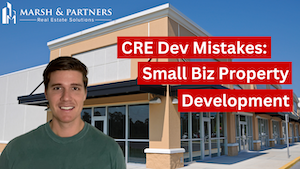Finding an Owner's Representative for Your Real Estate Development
There are all sorts of reasons why someone might be interested in real estate development.
It's common for "non-full-time real estate developers" to find themselves in a situation where they might not have the means nor the expertise to tackle a project. And in the development business, complexity and inexperience are the thief of profits. Deals die because project owners fail to assemble the right development team around them, aren't well versed in permitting and land entitlement, or don't properly manage project design, and costs balloon out of control.
In this video, we cover everything that project owners, real estate investors, and small business owners need to know about finding an owner's rep for their development project.
Bringing the right owner's representative on can't be left up to chance and should be an intentional aspect of every development business plan.
Guide to the video
- An owner's representative is responsible for representing a project owner's interests and delivering on their vision throughout development
- Owner's reps should be experts in all the technical aspects of the real estate development process
- It's important for an owner's rep to contribute experience in real estate strategy and development consulting, offering expertise beyond simply what a project manager can
Video transcript follows
I’ve said it many times before and I’ll keep saying it; the real estate development process is complex. And complexity is the thief of profits – there’s no award for fumbling through an intricate project that doesn’t make any money.
But because the development business is complex - there can be a disconnect between project owners and their ability to execute successfully. That’s where an owner’s representative comes in – someone with the skills and expertise in real estate development that can bridge the gap between the owner and project completion.
In this video, I am going to discuss the owner rep business model, how it works, and how to go about finding the right one as project owner.
----------
What’s up everyone – it’s Matt Marsh with Marsh & Partners.
Marsh & Partners is a development and national consulting firm that helps business owners and investors maximize their real estate and transform their businesses.
If you’re enjoying what we’re doing here, and want to keep seeing more content like this, please hit that like button and share this video and our other videos with people you think might find some value in them.
What is an owner's representative in real estate development?
The land development industry has never been one built on information sharing.
What exactly does that mean?
It means that real estate developers look at their experience as their intellectual property and theirs only. And in some cases, they should. It takes years, and exposure to various kinds of projects to develop the skills necessary – the problem is that you don’t know what you don’t know.
The development industry has long profited off the fact that most people have no idea how to navigate a project – the expertise required to get a deal through planning, land entitlement, and construction crosses over so many traditional real estate and business functions.
And the network of industry services providers required is a huge barrier to entry to. Owners need relationships with trades like a surveyor, environmental consultant, civil engineer, architect, contractor, and land use attorney to name a few.
So, all that is to say that most project owners – small businesses building a new facility, or real estate investors sitting on some developing land – aren’t equipped to self-manage a development.
That’s where a real estate development owner’s representative comes in. In the construction world, an owner’s representative is a development professional hired to represent the owner’s interest throughout a project. The owner’s rep will essentially manage the entire project. What does that entail exactly? Let’s dive in.
What can you expect from an owner's rep?
Real estate development projects are laden with risk. And without previous experience, it’s impossible to be able to foresee and sidestep some of the inevitable setbacks.
When a project owner lacks expertise in design and construction, or doesn’t have the time to self-manage a project, an owner’s rep fills that void. At its core, the owner’s representative will act as the project owner’s advocate and represents their best interests.
Assembling the real estate development team that best fits the project is a major aspect of the owner’s reps’ responsibilities. Consultants often bring their own priorities to a project. But by executing on the owner’s vision, the developer will serve as the foundation keeping the team’s efforts properly aligned. And with all the disparate functions and tasks that you commonly encounter during land development, that often quickly turns into a full-time job.
An owner’s representative should have expertise in the following areas of land development:
- Site selection & land acquisition: Finding the right property, in the right place, at the right time as critical to the success of a development. The functionality of a property is impacted by things like topography, access to utilities, required off-site improvements, environmental characteristics, etc. Structuring the land contract to allow for flexibility on the front-end of a project is also important.
- Real estate due diligence: Different types of commercial real estate transactions require different types of investigations. And in order to properly mitigate risk, those due diligence tasks need to be sequenced properly. It’s important that before pursuing a land development, all the critical investigations are done ensuring the land can support the intended use.
- Site & project design: The site plan is the crux of every development project. It’s set the stage for what the development will look like on the ground. Overlay the architectural drawings designs that are fleshed out during pre-development and you have a lot of design work that influences later stages of the project.
- Project budgeting: The process of creating a development budget happens iteratively throughout a project. Conceptual estimates are compiled early, based on schematic designs, and refined as more design details are codified. The owner’s rep should be the driving force of budget management and refinement.
- Development financing: While the project owner is the one financially responsible for the development, an owner’s representative can assist in putting together a strategy for obtaining financing. The real estate development capital stack is often complex and a real estate developer can help broker introductions with different lending sources to
- Land entitlement: Land entitlement is a loaded term, but basically, it’s the administrative process of obtaining all the legal permits and approvals to build a project. During this phase, the site plan and all the engineering construction drawings are reviewed, and any property rezoning, conditional use permits or variances are obtained.
- Construction cost management: This is a continuous process throughout a project – it begins during the design phase. Adequately managing the project design is the single most important thing you can do to control project costs. And as the development progresses, the design becomes reality, and the real estate developer is responsible for coordinating and managing the budget and contractors during construction.
- Risk management: Risk management is a very broad term, especially as it pertains to land development. But consider the various risks considerations to weigh – legal and political risk, land entitlement risks, financing risk, construction risk. Project owners are frequently entrepreneurs that are well-versed in identifying and managing risk in other aspects of their businesses. Owner’s representatives should be expert risk mitigators in every facet of the development process.
That’s not an exhaustive list but gives you a good idea of just how much an owner’s representative is responsible for during a project. And how much value they can provide to a project owner.
The true value of an owner’s rep is in providing the framework for the project consultants to do their jobs unhindered, all while maintaining a laser focus on achieving the owner’s vision as efficiently and inexpensively as possible.
What to look for in an owner's rep
Finding a quality owner’s rep is much more than finding someone who can simply help manage the process and mechanics of a development.
There are some intangible qualities and characteristics that project owners should also consider looking for:
Project specific experience
I’ve mentioned a couple of times that every development project is different. Each piece of land poses unique challenges – requiring an individual set of real estate due diligence tasks and nuance with permitting and dealing with the specific municipality.
But aside from the obvious differences, consider the disparities between retail and multifamily development, or industrial and urban residential infill. They’re night and day different and each requires a unique skillset, different approach to design and project management, and network of professionals that excel in the proposed asset type.
It’s imperative to find an owner’s representative that has specific experience in similar kinds of projects. That ensures a much higher likelihood for a successful project.
Expertise in real estate strategy
Of course, execution is important because that’s where the rubber meets the road on these development projects. But simply executing is something that many developers can handle – it’s a service that’s easily commoditized.
When looking for an owner’s representative, it’s important to find someone that has experience in real estate consulting and strategy as well. While looking out for the project owner’s best interests, the rep will assist in steering the project to better meet the owner’s outcome intent. It’s not uncommon that an owner will come to me saying they want to build “x”, and after some discussion around project goals and investment strategy, we change course and pivot to build “y” instead.
Owner’s representative is a term that’s been coopted and commoditized. Instead find a real estate development consultant that can offer expertise beyond what a project manager can.
A focus on optionality
Too many choices are overwhelming. Especially if the project owner is not well-versed in the development process.
But giving owners the flexibility to make decisions is important – structuring a project offering multiple exit opportunities and articulating multiple courses of action with their associated financial and operational impacts.
For example, what’s the impact of designing the stormwater infrastructure to handle future iterations of a phased development? There is a financial impact today, but also an operations impact in the future. How about capturing stormwater above vs. below ground? That decision carries financial considerations and has development density implications.
The point is that you should find an owner’s rep that not only has the experience to navigate and consider these decision points, but someone who is willing to ask the tough questions as well. A “Yes Man” does a project owner no good during land development.
Conclusion
Construction owner’s representation offers a model to help project owner’s navigate land development. It can be a critically important service if the owner lacks certain technical development skills and expertise or doesn’t have the time to self-manage a project.
By representing an owner’s interests throughout the project, the owner’s rep will help mitigate risk, ultimately achieving greater project profitability.
Engaging the services of an owner’s representative is important to do early in the project. They’ll not only help manage the technical aspects of a project – elements like site and building design, real estate due diligence, and permitting. But offer insights on some of the project intangibles like course of action optionality, and other real estate consultative services.
Delivering the right building in the right place at the right time lies at the intersection of tax implications, investment and business operations, legal structure considerations, business growth, and financial return parameters. Weighing these influences and delivering a project that meets the owner's intent is much more than just constructing a building.
If you’re a small business whose space needs have changed, but you’re not quite sure what makes sense, we’re happy to help with that early analysis. In many cases, ground-up development vs. buying makes sense for businesses. If you arrive at that conclusion, an owner’s rep could be an essential member of that project team. And if you’re a real estate investor that has a vision or even has a property that is underutilized, an owner’s representative can help you achieve its highest & best use.
At Marsh & partners, we’re developers by trade, but consult with small businesses, real estate developers and investors, and landowners to help them achieve the optimal portfolio and real estate outcome.
Check out our real estate consulting services to learn more about how we might be able to help.
----------
If you enjoyed this video hit the like button and subscribe to our channel to stay up to date on content to help you through your real estate journey.
You can also check out our site for more real estate insights at marsh-partners.com.
Feel free to leave us a comment if there are any other topics you’re interested in or would like us to cover.
Don’t forget to subscribe if you want more content like this and thanks for watching.



